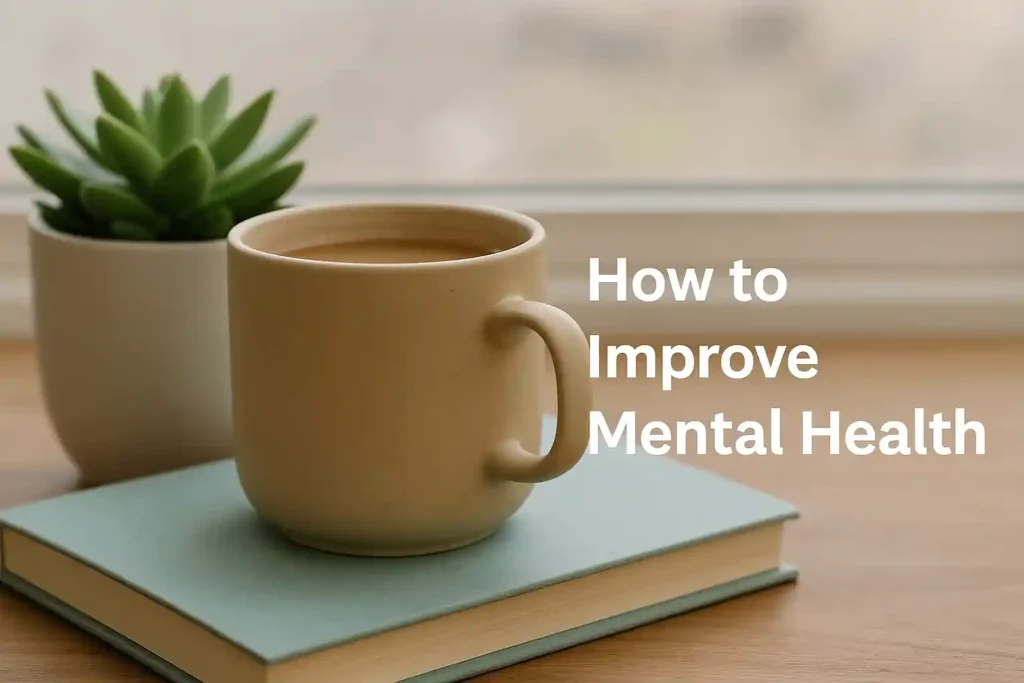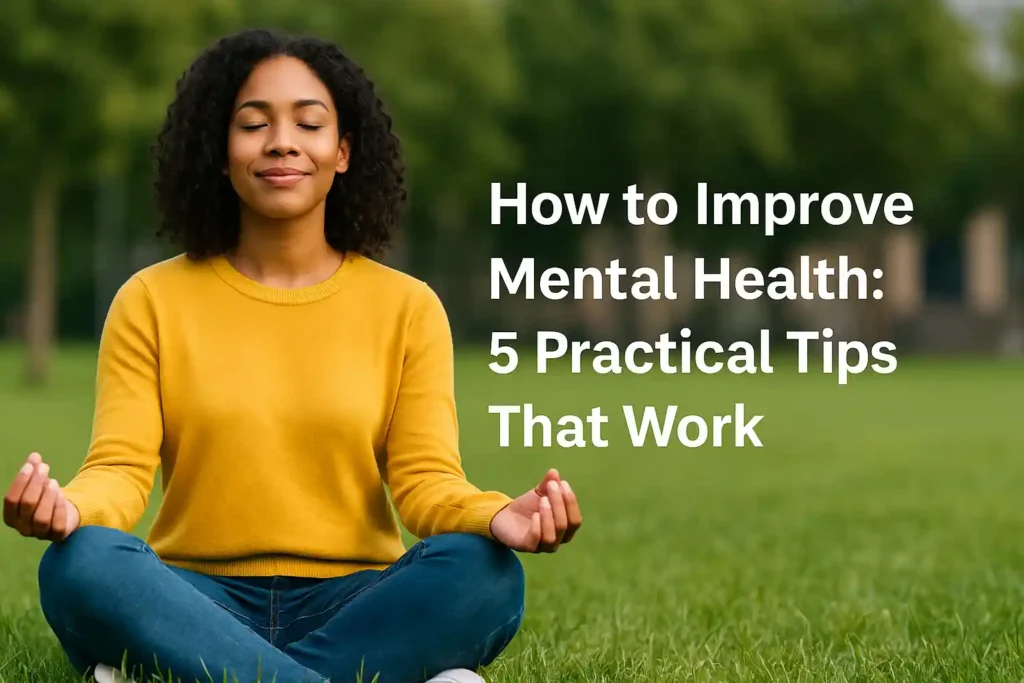Improve mental health, Let’s be honest: when people talk about “Improving mental health” it can sound like a vague, lofty goal — a bit like chasing clouds with a butterfly net. The truth is, mental health is a moving target. What works brilliantly one week might feel ineffective the next. But over the years (in my experience, working with others and managing my own well-being), I’ve noticed there are a handful of habits and mindsets that tend to make a lasting difference.
Table of Contents
1. Start Small With Manageable Habits
If you’ve ever tried to overhaul your entire lifestyle in one go, you’ll know what I mean when I say: it backfires fast. The brain doesn’t love radical change overnight. Instead, it seems to warm up best to tiny, manageable shifts. For example, instead of saying “I’m going to meditate for 30 minutes every day,” maybe just sit quietly for two minutes. That’s it. Two minutes. I’ve seen people beat themselves up endlessly for not sticking to ambitious routines — when really, the smaller, consistent actions build more confidence over time.
2. Move Your Body Without Overthinking Exercise
Physical activity is one of those things that’s almost universally praised for improving mental health — and for good reason. Exercise changes brain chemistry in ways that boost mood, reduce anxiety, and increase focus. But here’s something worth noting: you don’t have to run marathons or take up CrossFit to benefit. A simple 20-minute walk around the block often clears the mind better than an intense workout that you dread. To be honest, I used to think if it wasn’t an hour-long gym session, it “didn’t count.” I was wrong. It all counts.
3. Build Meaningful Social Connections
Humans are social creatures. Even the most introverted people (I’m pretty introverted myself) seem to need some form of connection to feel grounded. That said, “connection” doesn’t always mean big group gatherings or constant socializing. Sometimes, a five-minute chat with a friend, sending a thoughtful text, or even interacting briefly with a neighbor can lighten the mental load. It’s likely that the quality of interactions matters more than the quantity — so don’t pressure yourself to be everywhere with everyone.

4. Prioritize Better Sleep for Mental Clarity
I won’t preach the standard “get 7–8 hours” line (you’ve heard it a thousand times). But I will say this: poor sleep makes everything harder. It’s like trying to run your phone on 5% battery all day. Things that normally wouldn’t bother you become overwhelming. Personally, I’ve found that setting a consistent wake-up time — not just a bedtime — helps anchor my sleep patterns better than any fancy app or supplement. It’s arguably the simplest “hack” that gets overlooked.
5. Question Your Negative Thoughts (Gently)
Our minds are chatterboxes. Constantly running narratives about who we are, what we can or can’t do, and how others see us. It seems like the mind’s default mode is to protect us — but sometimes it protects us from things we don’t need protecting from. Cognitive behavioral therapists often say, “Thoughts are not facts.” I didn’t fully grasp that until I started questioning my own negative spirals. For example, just because I think I failed at something doesn’t mean I actually did. Noticing these patterns — without judgment — can open up surprising freedom.
Final Thoughts on Improving Mental Health
Improving mental health isn’t a checklist you tick off once and move on from. It’s more like tending a garden. Some seasons require more care, some less. There’ll be days you feel on top of the world and days you feel like you’re trudging through wet cement. Both are normal.
If I had to boil it down, I’d say: start with tiny steps, stay curious about your inner world, and don’t be afraid to ask for help when things get heavy. You’d be surprised how many people — quietly — are working on the same things you are.
And hey, if all else fails, take a walk, drink a glass of water, and call a friend. That combination has rarely steered me wrong. Learn more about mental health basics.
Frequently Asked Questions
What are simple ways to improve mental health daily?
Simple daily actions like taking a short walk, practicing deep breathing, or connecting with a friend can significantly boost mental well-being. Consistency in these small habits often leads to noticeable improvements over time.
How does exercise benefit mental health?
Regular physical activity releases endorphins, which can elevate mood and reduce stress. Even moderate exercises like walking or yoga can enhance mental clarity and emotional resilience.
Can sleep affect my mental health?
Absolutely. Quality sleep is crucial for emotional regulation and cognitive function. Establishing a consistent sleep routine can help improve mood and reduce anxiety.
Why is social connection important for mental well-being?
Engaging with others provides emotional support and a sense of belonging. Regular social interactions can decrease feelings of loneliness and contribute to overall happiness.
What role does nutrition play in mental health?
A balanced diet rich in nutrients supports brain function and can influence mood. Foods high in omega-3 fatty acids, for instance, are linked to reduced symptoms of depression.
How can mindfulness practices improve mental health?
Mindfulness techniques, like meditation and deep breathing, help individuals stay present and manage stress. Regular practice can lead to increased self-awareness and emotional balance.
Are there quick techniques to reduce stress?
Yes. Techniques such as deep breathing exercises, progressive muscle relaxation, or taking short breaks can quickly alleviate stress and promote relaxation.
How does journaling help with mental health?
Journaling allows individuals to process emotions and reflect on experiences. This practice can lead to increased self-understanding and reduced anxiety.
What are signs that I should seek professional mental health support?
Persistent feelings of sadness, withdrawal from social activities, or difficulty managing daily tasks may indicate the need for professional help. It’s essential to consult a mental health professional if these symptoms persist.
Can spending time in nature improve mental well-being?
Yes. Nature exposure has been linked to reduced stress and improved mood. Activities like walking in a park or gardening can enhance mental clarity and relaxation.
How does limiting screen time benefit mental health?
Reducing screen time, especially on social media, can decrease feelings of anxiety and improve sleep quality. Setting boundaries with digital devices promotes better mental balance.
What are effective ways to build resilience?
Developing coping strategies, maintaining a supportive social network, and setting realistic goals can enhance resilience. Engaging in regular self-care practices also strengthens the ability to navigate challenges.
Read our Blog here… How to Improve Gut Health Naturally, How to Boost Metabolism, Black Coffee Benefits, Health Benefits of Matcha, Lemongrass Benefits, Health Benefits of Apples

